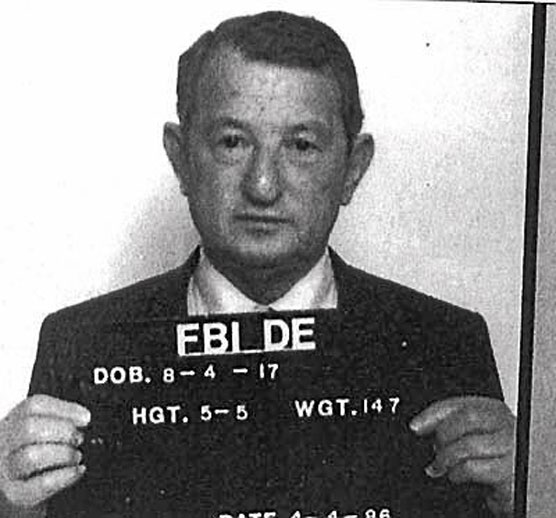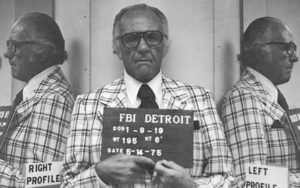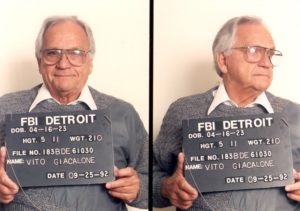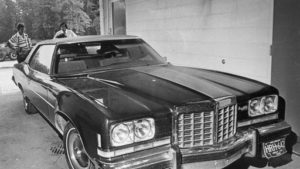Following the facts to possible Hoffa hit house
Forty-five years after disappearance of labor boss, new source identifies location where he was killed

In the fall of 2019, as a mentor of mine out East closed in on where Jimmy Hoffa’s body is very possibly buried, I was at ground zero for the storied Hoffa case in Detroit, running down a tip pointing to where he was killed. The two locations might be the final pieces of the puzzle that finally solve one of the most speculated-upon murder mysteries in American history.
In October 2019, Dan Moldea, the world’s preeminent expert on the case, traced Hoffa’s remains to the site of a former mobbed-up trash dump in Jersey City, New Jersey. Just weeks later, I was approached by a source with deep connections in organized crime in southeast Michigan and was told that Hoffa was murdered at the residence of Leonard “Little Lenny” Schultz, a Jewish racketeer and old-time Purple Gang affiliate with whom Hoffa had been friendly for decades.
The two scenarios fit together instantly. My source provided information that directly tied to Dan Moldea’s theory and reporting.
When I was a young reporter entering the hallowed halls of “Hoffaology” in the 2000s, Dan took me under his wing. Our research hasn’t always synced. Our views have differed on a small number of things in pockets of the case. But our respect for each other and passionate love of the endeavor have made us a determined tandem (determined to get to the bottom of the case that Dan proudly and rightly refers to as his “white whale”).
Today, in the wake of the 45th anniversary of Hoffa’s kidnapping and murder, our reporting syncs perfectly.

The 62-year-old Hoffa, the face of the American labor movement in the mid- to late 20th century, vanished on his way to a sit-down with a trio of Mob figures in Bloomfield Township, Michigan, 45 years ago this week. The firebrand Teamsters boss, who clashed with his former allies in organized crime regarding a potential return to the goliath union’s presidency, was last seen in the parking lot of the Machus Red Fox restaurant on the afternoon of July 30, 1975. He was getting into a maroon-colored Mercury Marquis owned by the son of fearsome Detroit Mafia street boss Anthony “Tony Jack” Giacalone.
Hoffa’s datebook indicated a lunch meeting with “Tony G, Tony P and Lenny S” at the Red Fox, a popular fine-dining establishment 20 miles from Hoffa’s summer cottage on Lake Orion and seven miles north of Detroit’s city limits. “Tony G” was Tony Giacalone, Hoffa’s longtime handler for the Mafia. “Tony P” was New Jersey Mob capo and Teamsters power broker Anthony “Tony Pro” Provenzano, a one-time close friend of Hoffa’s turned bitter enemy. “Lenny S” was Little Lenny Schultz, a high-ranking Mob associate, labor consultant and Tony Jack’s liaison to Hoffa and buffer for all his union affairs.
I grew up down the street from the Machus Red Fox and was always fascinated by the mythology surrounding Hoffa’s disappearance and how, especially in Metro Detroit, the question of what happened to Jimmy Hoffa is embedded in the cultural fabric. I’ve been reporting on the case for 15 years now, and I’m credited with breaking a number of major stories related to the investigation.
The dapper and diminutive Schultz owned Tony Giacalone’s headquarters, the Southfield Athletic Club, and was a fixture in the Detroit area’s Jewish community until he died in 2013 at age 96. He began in the rackets as a teenager, running errands for the headline-grabbing Purple Gang, the city’s notorious Jewish Mob of the 1920s and ’30s. He was a driver for Purple Gang lieutenant, Abe “Abie the Agent” Zussman and learned the union consulting business from Purples such as Jack “Babe” Bushkin and Joseph “Monkey Joe” Holtzman, two of his early mentors.
Schultz was a deal maker and a diplomat, someone who connected a lot of dots for people of varying personalities in an array of business sectors. It was a skill that served him well.
Through his background with the Purples, Schultz met Hoffa and Tony Giacalone.
According to FBI documents, Schultz helped Giacalone and Tony Jack’s younger brother, Vito “Billy Jack” Giacalone, a respected and capable Mob capo in his own right, arrange for Hoffa to meet Tony Provenzano at the Red Fox the day he disappeared. Hoffa was feuding with Tony Pro over bad blood from a stay in Lewisburg Federal Penitentiary. Hoffa needed Provenzano’s support, though, to reclaim the Teamsters and requested assistance from Schultz and the Giacalones, who were related to Tony Pro via marriage, in squashing their beef, per the documents.

Tony Giacalone and Schultz didn’t leave each other’s side all day on July 30, 1975, holding court at the Southfield Athletic Club, a little less than five miles south of the Red Fox, where they were supposed to be meeting Hoffa. Tony Pro was playing cards in his union hall in New Jersey. Billy Giacalone didn’t have an alibi for the day Hoffa went missing and was unaccounted for by both FBI and Michigan State Police surveillance units the entire afternoon.
I was contacted by a source in November 2019 and asked to meet with him about the Hoffa case. This source had worked for Lenny Schultz and acted as a collector for the Giacalone brothers. He didn’t want his name to be released, but he told me I could report what he told me: Jimmy Hoffa was killed at Lenny Schultz’s house in Franklin Village, Michigan.
“Lenny and I were driving on Telegraph (the street the Red Fox was on) one day. I was taking him to an appointment. This is years after Hoffa was gone . . . and he just said it,” the source recalled. “He said, Jimmy bit the dust at his place and it wasn’t a shooting. … He said Tony Jack had the house keys and they choked him out in the living room. Then they gave the body to Rolland McMaster to get rid of it. He was real quiet the rest of the drive that day. It seemed like he just wanted to get it off his chest. He never said another word about it to me.”
This is where the story dovetails with Dan Moldea’s reporting. Dan has always placed “Big Mac” McMaster in the murder plot. McMaster was a legendary Teamsters goon, labor muscle for the Mob for years with a reputation for violence that stretched coast to coast. McMaster and Hoffa were once tight. At the time of his disappearance, however, they were rivals. McMaster had led a campaign of intimidation (beatings, bombings, bully tactics) against Hoffa and his allies in the preceding year in an attempt to get Hoffa to drop out of the union presidential election.
The FBI searched McMaster’s Hidden Dreams Ranch in Commerce, Michigan, in 2006 looking for Hoffa’s body, but came up empty. When Dan developed New Jersey Mob figure Phil “Brother” Moscato as a source late in Moscato’s life, Moscato, a confidant of Tony Pro and one of the biggest loan sharks in the Garden State during his gangland prime, told Dan that Hoffa’s body was transported from Detroit to New Jersey in a Gateway Transportation truck and laid to rest at his PJP Landfill underneath the Pulaski Freeway. McMaster owned Gateway Transportation.
Schultz’s house was a five-minute drive west of the Red Fox and a straight shot up Maple Road to Hidden Dreams Ranch. Per FBI informants and grand jury testimony, the Giacalones felt comfortable using Schultz’s house for “wet work,” and had killed furniture mogul Harvey Leach at Schultz’s residence 16 months before in the spring of 1974. Another one of Dan’s sources claims he witnessed unusual activity at the ranch late in the evening of July 30, 1975 — cars speeding in and away from the property in the dark of night.
In the interest of full disclosure, for the last dozen years I’ve been espousing another theory regarding the spot where Hoffa was murdered. I’ve reported and been on national television discussing my belief that Hoffa was killed at Detroit Mob soldier Carlo Licata’s house, a five-minute drive north of the Red Fox and a residence at which Hoffa had met the Giacalone brothers several times before. Licata was the brother-in-law of the Detroit Mafia’s acting boss at the time, Giacomo “Black Jack” Tocco, and died under suspicious circumstances at the residence, known as the “house on the hill,” off Long Lake Drive in Bloomfield Township, Michigan, on the six-year anniversary of Hoffa’s disappearance.
I am not abandoning my Licata theory. Too many people on both sides of the law have confirmed for me that is where he was taken and bumped off. That said, I am an investigative reporter, and I have to go where the facts lead me.
This new theory makes a lot sense. I find it completely plausible and possible that Hoffa was killed at Lenny Schultz’s house, not Licata’s.
Around the same time that I was rethinking my research, Dan was hitting paydirt in New Jersey. Literally. Although Brother Moscato admitted to Dan that he was in charge of burying Hoffa’s body at the PJP Landfill, he never filled Dan in on exactly where his remains rested on the property before dying of cancer in 2014. That part of the equation came from Frank Cappola last fall.
Cappola’s dad, Paul, was Brother Moscato’s partner in the PJP dump, and Paul spilled the beans to his son on his deathbed back in 2008. Last October, an ailing Frank Cappola, a former wiseguy himself, took Dan to the precise spot — now part of a state park and nature preserve — where his father told him he had buried Hoffa’s body in a 55-gallon industrial drum the night after Hoffa disappeared. Cappola died of a respiratory ailment on March 16 of this year.
Acting on a tip from Tony Provenzano’s driver, the feds searched the PJP Landfill for Hoffa’s body in the months after he went missing, and they didn’t find anything. But they didn’t have the specifics that Dan does now, and I think they’ll be searching there again soon.
If anyone in this crazy, surreal and quite well-documented near half-century journey of tracking down leads in the Hoffa disappearance deserves to be the man who can finally say he found Hoffa’s tomb, it’s Dan Moldea. This man is an institution in the world of hard-nosed, unrelenting reporting, much the way Hoffa was in labor politics. Investigative journalists everywhere owe him a great debt. When it comes to Hoffa research, reporting and knowledge, he’s the trailblazer.
That’s the truth, whether we ever find Hoffa’s body or not.
The Detroit FBI office continues to actively pursue the Hoffa case. The feds strongly subscribe to the belief that the Hoffa homicide conspiracy was put into motion by Black Jack Tocco and Tony Giacalone (on the orders of Tocco’s uncle and Tony Jack’s mentor, Godfather Joe Zerilli) in Michigan, and that the hit team consisted of Billy Giacalone, Detroit Mob soldier Anthony “Tony Pal” Palazzolo and New Jersey mobster Salvatore “Sally Bugs” Briguglio, Tony Provenzano’s top enforcer.
Palazzolo bragged of involvement in the Hoffa hit on an FBI wire in the 1990s, and an informant told the FBI in 2012 that Tony Pal beat and strangled Hoffa to death. Many in the FBI working the case today believe Tony Pal did the deed. Brother Moscato told Dan that Billy Giacalone kidnapped Hoffa from the Red Fox parking lot in his nephew Joey’s car, and that Salvatore Briguglio shot him in the back of the head at a nearby residence.
That residence could very well have been Schultz’s house in tony Franklin Village, a small, exclusive community reminiscent of the New England countryside. It’s a 10-minute drive from the Giacalone crew’s nerve center at the Southfield Athletic Club and less than a half-hour’s drive to downtown Detroit and Hoffa’s Teamsters HQ on Trumbull Avenue around the corner from historic Tiger Stadium. The Giacalones are thought to have handled a similar problem at Schultz’s house the year before.
Blood washes blood.
Local whiz-kid entrepreneur Harvey Leach was last seen alive heading to a meeting at the Schultz residence with Schultz and Tony Jack on the morning of March 15, 1974. Leach, 34, was found dead in the trunk of his car the following afternoon, hours before he was supposed to be getting married. According to FBI records, Leach was being muscled out of his trendy Joshua Doore furniture store chain by the Giacalone brothers after Schultz had brokered a loan for Leach to expand the business and the Giacalones robbed the place blind instead. Rumors were also floating around that the debonair and sophisticated Leach had angered Billy Giacalone for bedding one of his girlfriends while Billy Jack was out of town serving a state prison term in the early 1970s.
Just five months before Hoffa’s kidnapping and execution, Lenny Schultz’s home was burglarized. In a press interview, Schultz accused the FBI of staging the break-in to illegally search for evidence linking the property to the Leach murder. A source once told Moldea that the same gun used to kill Hoffa was used to kill Leach.
Schultz and the Giacalone brothers were each called to testify before grand juries investigating both the Hoffa and Leach homicides. Nobody has ever been charged in either case.
The Giacalones and Schultz did subsequent prison sentences for unrelated felony convictions. Tony Jack died of kidney failure in 2001 under indictment in a RICO prosecution. Billy Jack died of natural causes in 2012. Together, they had run day-to-day operations for the Detroit Mafia since the late 1950s.
Rolland McMaster died in 2007 of heart failure. Tony Provenzano dropped dead of a heart attack in prison in 1988. Stomach cancer took out Tony Palazzolo, who had risen to consigliere of the Tocco-Zerilli crime family by the end of his gangland career, last winter. Sally Bugs didn’t make it out of the disco era. He was gunned down walking out of a Manhattan social club in 1978.

Joey Giacalone’s car, his then-new Mercury Marquis, is the only piece of physical evidence ever recovered in the investigation. Hoffa’s DNA was found in the vehicle’s trunk and backseat.
Lenny Schultz did a few years in the joint for cocaine dealing in the late 1980s and early ’90s, but mostly lived his final years off the map in retirement, quietly shuffling between Michigan and Miami Beach and enjoying his last days in the sun, wealthy and healthy well into his 90s. He had a knack for sidestepping landmines, a valuable resource in his line of work. People said he could talk his way out of anything.
He once admitted in open court that he had given information to the government as an informant. Under most any other circumstances, the Giacalones would have slit his throat and stuffed him down a drainpipe. These are two men allegedly responsible for two dozen gangland slayings apiece, minimum. But Lenny got a pass. That’s got to say something about the man.
I met Lenny Schultz when I was in college at a family weekend where he was visiting his grandson, who was a classmate of mine at Indiana University. Our fathers had attended law school together. We were all at a bar, eating, drinking, watching football. And I remember my dad taking me over to the side and whispering in my ear that Lenny was supposed to be with Jimmy Hoffa and Tony Giacalone the day he vanished into thin air.
Maybe I should have just gone straight to the horse’s mouth and asked him what happened myself.
Scott M. Burnstein, a journalist and author in the Detroit area, is the author of several books, including Mafia Prince: Inside America’s Most Violent Crime Family and the Bloody Fall of La Cosa Nostra, Motor City Mafia: A Century of Organized Crime in Detroit, and Family Affair: Greed, Treachery, and Betrayal in the Chicago Mafia.
Feedback or questions? Email blog@themobmuseum.org





